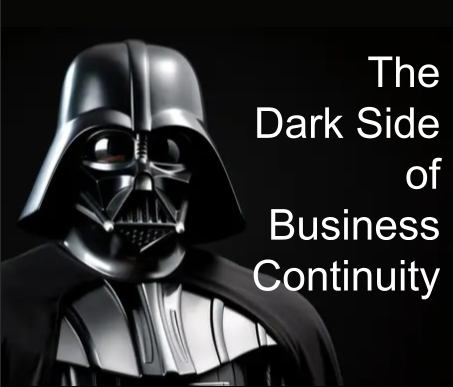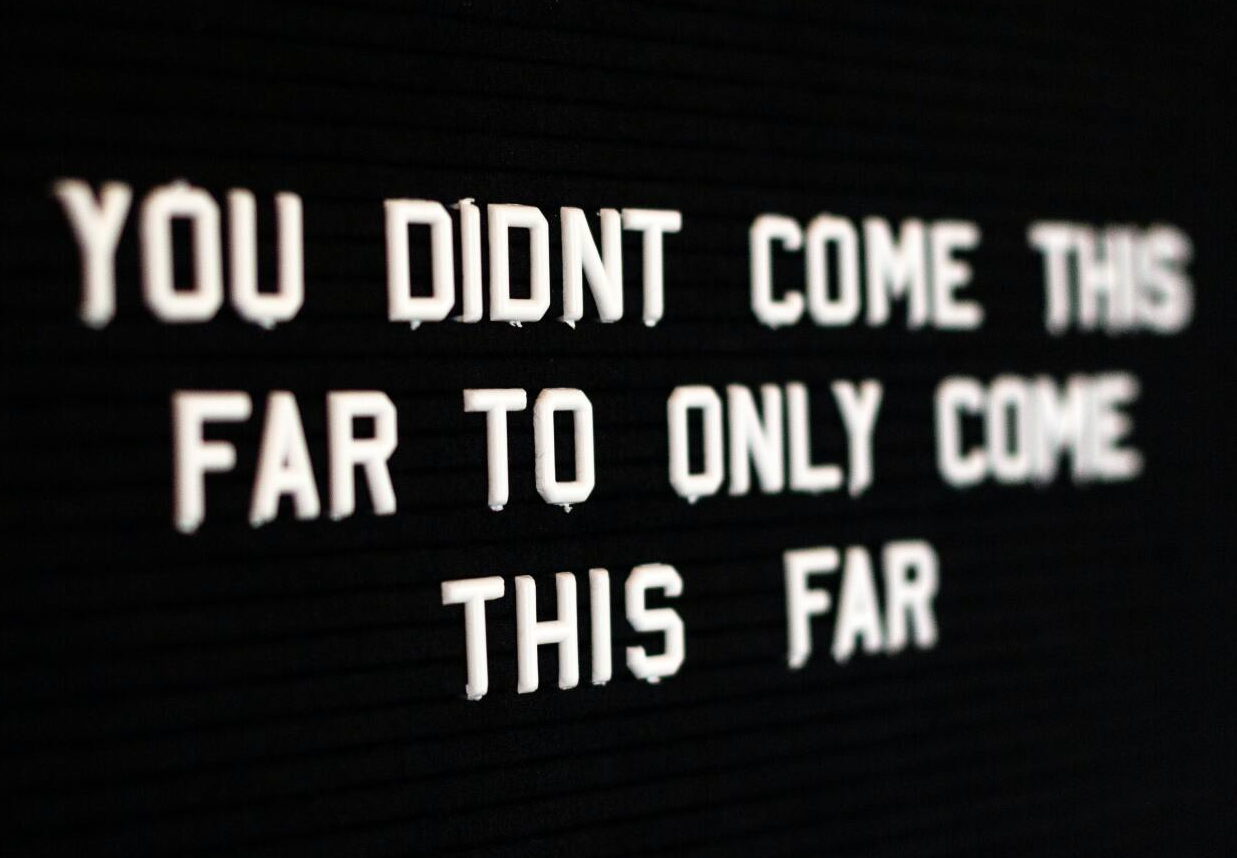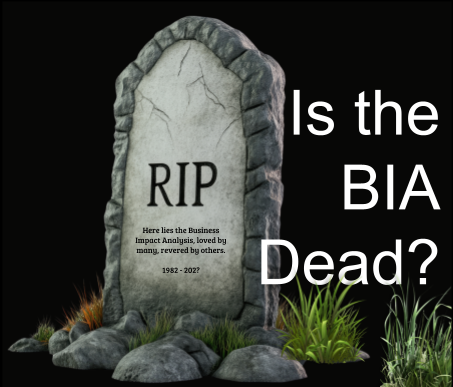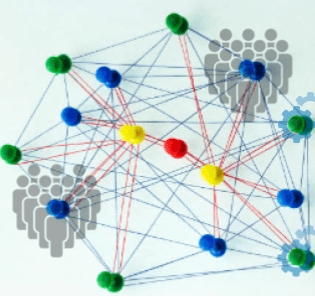Beware of Intellectual Snobbery - Don't be a Roundie
Don’t be a ‘Roundie’
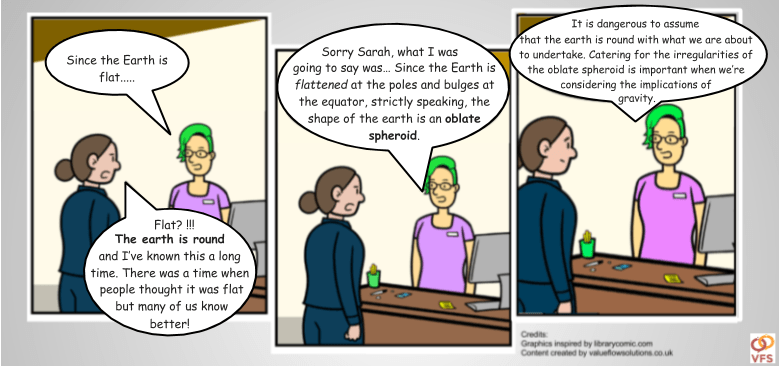
This is the first in an ongoing series 'The Roundie'.
I observed a senior manager interrupt a more junior member of staff the other day and watched as the manager had a rather painful and embarrassing reminder of the benefits of patience, to listen but also to explore why others are saying what they are saying... and why they hold such views.
The conversation was related to lean thinking, something the manager clearly knew quite a lot about, but not as much as the junior. Using a generic metaphor, this is effectively what I heard:
Junior: “Since the Earth is flat....."
Manager [abruptly interrupting]: “Flat? The earth is round and I’ve known this a long time. There was a time when people thought it was flat but many of us know better.”
Junior: “Sorry Sarah, what I was going to say was… Since the Earth is flattened at the poles and bulges at the equator, strictly speaking, the shape of the earth is an oblate spheroid . It is dangerous to assume that the earth is round with what we are about to undertake. Catering for the irregularities of the oblate spheroid is important when we’re considering the implications of gravity.”
Sticking with this simple metaphor, there are those that know the earth is round and those that know it is not.
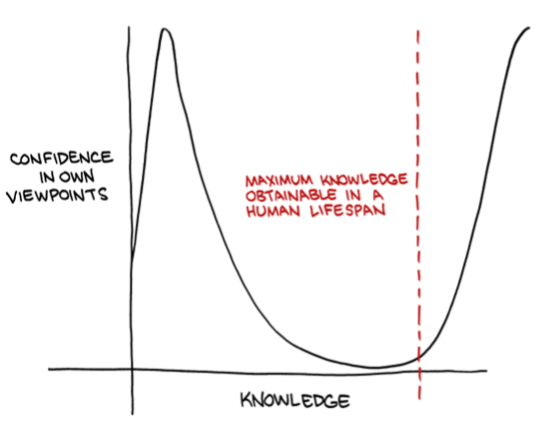
The Roundies , as I’ll refer to them, often don't stop to listen to those that disagree because they think they know more. We all do it at times. I have equally seen it many times from people with a few years of experience under their belt, not paying due respect to more experienced colleagues.
Roundies are often found standing on Zach Weiner’s Mount Stupid.
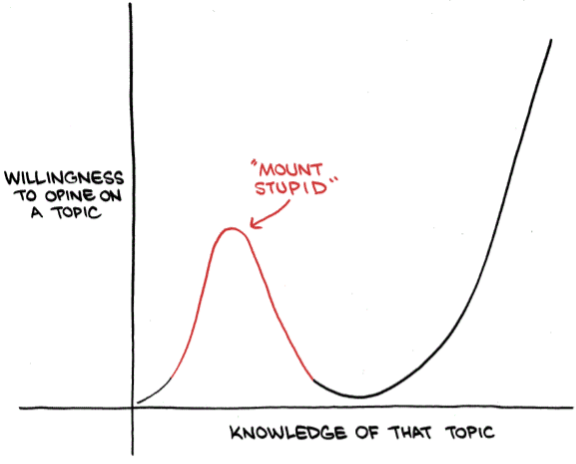
Don’t be a Roundie , there is always more to discover and learn no matter how much we know.
Read more in part 2 - Onwards & Downwards: The Roundie Sharpens Up
Further Reading
This topic is related to The Dunning-Kruger Effect.
The
Dunning–Kruger effect is a
cognitive bias in which people with low ability at a task overestimate their ability. It was described by social psychologists David Dunning and Justin Kruger in their 1999 paper [1].
Many, more recent studies have continued to show strong evidence of this effect. A 2008 study by Joyce Ehrlinger summarised the major assertions of the effect: "People are typically overly optimistic when evaluating the quality of their performance on social and intellectual tasks. In particular, poor performers grossly overestimate their performances"
. [2]
Cultural Differences in self-perception
Studies of the Dunning–Kruger effect usually have been of North Americans, but studies of Japanese people suggest that cultural forces have a role in the occurrence of the effect. [3]
The study "
Divergent Consequences of Success and Failure in Japan and North America: An Investigation of Self-improving Motivations and Malleable Selves " [4] indicated that Japanese people tended to underestimate their abilities, and tended to see underachievement (failure) as an opportunity to improve their abilities at a given task, thereby increasing their value to the social group.
Seminal publications
1 -
Kruger, Justin; Dunning, David (1999). "Unskilled and Unaware of It: How Difficulties in Recognizing One's Own Incompetence Lead to Inflated Self-Assessments". Journal of Personality and Social Psychology.
77
(6): 1121–1134.
2 -
Ehrlinger, Joyce; Johnson, Kerri; Banner, Matthew; Dunning, David; Kruger, Justin(2008). "Why the unskilled are unaware: Further explorations of (absent) self-insight among the incompetent". Organizational Behavior and Human Decision Processes.
105
(1): 98–121.
3 -
DeAngelis, Tori (February 2003). "Why We overestimate Our Competence". Monitor on Psychology.
34
(2): 60.
4 -
Heine, S.J.; Lehman, D.R.; Ide, E.; Leung, C.; Kitayama, S.; Takata, T.; Matsumoto, H. (October 2001). "Divergent Consequences of Success and Failure in Japan and North America: An Investigation of Self-improving Motivations and Malleable Selves". Journal of Personality and Social Psychology.
81
(4): 599–615
